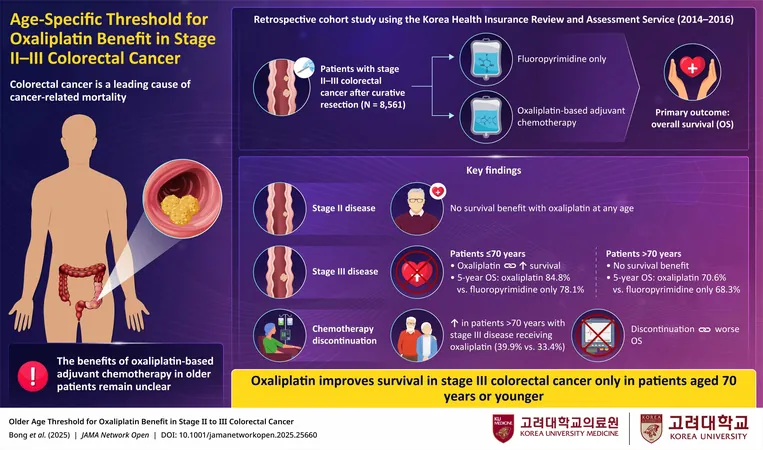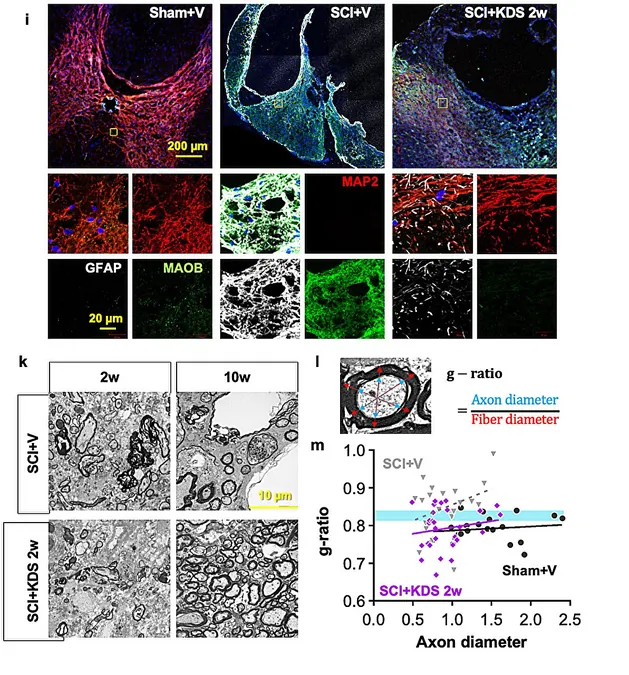
Breakthrough Study Reveals Age 70 as Key Cutoff for Chemotherapy Success in Colorectal Cancer
2025-09-18
Author: Nur
Colorectal Cancer: A Silent but Deadly Threat
Colorectal cancer is a leading cause of cancer-related deaths globally, particularly affecting older adults. As the incidence rate continues to climb in this age group, a crucial question has emerged: Should older patients receive oxaliplatin, a common chemotherapy drug associated with serious side effects?
Groundbreaking Study Unveils Age Threshold
To shed light on this pressing issue, a team of researchers led by Dr. Jun Woo Bong from Korea University Guro Hospital embarked on an extensive study involving over 8,500 patients diagnosed with stage II or III colorectal cancer who received surgery and chemotherapy between 2014 and 2016. Their findings, published online August 6, 2025, in JAMA Network Open, reveal a pivotal age threshold when it comes to oxaliplatin's effectiveness.
Staggering Findings About Oxaliplatin's Efficacy
The research findings are compelling. Among stage III patients aged 70 and younger, oxaliplatin dramatically reduced the risk of death by 41%, enhancing five-year survival rates from 78% to nearly 85%. However, for patients over 70, oxaliplatin failed to offer any survival advantages and was linked to significantly higher rates of treatment discontinuation. Alarmingly, almost 40% of older patients stopped chemotherapy early, often due to adverse side effects.
Experts Weigh In
Dr. Bong emphasizes the crucial takeaway: "Oxaliplatin improves survival only for stage III colorectal cancer patients aged 70 or younger. Beyond this age, the benefit vanishes, often replaced by increased toxicity and treatment dropouts."
Practical Implications for Oncologists
These findings are not merely academic; they hold substantial significance for clinical practice. Dr. Jeong notes, "Oncologists can utilize this age threshold to make more informed, evidence-based decisions regarding oxaliplatin administration, sparing older patients unnecessary toxicity and discomfort."
A Step Towards Enhanced Oncology Efficiency
The implications extend to healthcare policy as well. By avoiding ineffective chemotherapy in older adults, healthcare systems could reduce costs, complications, and hospitalizations. This would allow for the reallocation of resources towards treatments and support services that genuinely enhance survival and quality of life.
Setting the Stage for Future Research
Dr. Lee highlights a broader vision: "Clinical practice guidelines might soon identify age 70 as a vital factor in recommending oxaliplatin, paving the way for more precise oncology approaches and future investigations into safer, more effective treatments for older patients."
Caveats to Consider
While the study's robust dataset bolsters its findings, the authors acknowledge limitations such as its retrospective design and absence of molecular marker data. Nevertheless, the scale and significance of the research are likely to influence oncology practices and guidelines profoundly.





 Brasil (PT)
Brasil (PT)
 Canada (EN)
Canada (EN)
 Chile (ES)
Chile (ES)
 Česko (CS)
Česko (CS)
 대한민국 (KO)
대한민국 (KO)
 España (ES)
España (ES)
 France (FR)
France (FR)
 Hong Kong (EN)
Hong Kong (EN)
 Italia (IT)
Italia (IT)
 日本 (JA)
日本 (JA)
 Magyarország (HU)
Magyarország (HU)
 Norge (NO)
Norge (NO)
 Polska (PL)
Polska (PL)
 Schweiz (DE)
Schweiz (DE)
 Singapore (EN)
Singapore (EN)
 Sverige (SV)
Sverige (SV)
 Suomi (FI)
Suomi (FI)
 Türkiye (TR)
Türkiye (TR)
 الإمارات العربية المتحدة (AR)
الإمارات العربية المتحدة (AR)